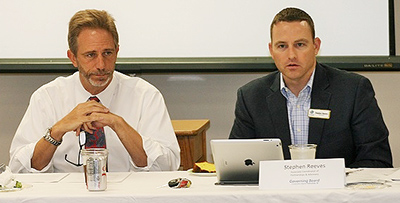By Bob Allen
One casualty of the Southern Baptist Convention conflict that led to formation of the Cooperative Baptist Fellowship in the early 1990s was a robust Baptist witness on issues of social justice, theologian David Gushee told CBF leaders Sept. 11.
“I think that some of the fragmenting and splintering in the Baptist family that we have all lived through has meant a kind of a disconnect with an already existing social ethical tradition among Baptists,” Gushee, a professor at Mercer University, told members of the CBF Governing Board. “Essentially with the SBC stuff, all of that got shattered.”
“In a sense, what I think it did was to weaken the ethical, especially the justice-oriented ethical, voice of Baptists,” said Gushee, who is serving in a one-year contract as theologian-in-residence for the Decatur, Ga.,-based CBF. With the addition of Stephen Reeves, who joined the CBF national staff last year as associate coordinator of partnerships and advocacy, Gushee said the CBF “has an opportunity, but it’s going to take some work, to help our people get back into contact with the best voices of our heritage.”
 “One value of doing so will help especially the younger generation to know that being Baptist as Baptists has mattered, and that some of the Baptist voices that we lift up are voices that we should be studying and should honor and should learn from even today,” Gushee said.
“One value of doing so will help especially the younger generation to know that being Baptist as Baptists has mattered, and that some of the Baptist voices that we lift up are voices that we should be studying and should honor and should learn from even today,” Gushee said.
Gushee said most of his experience in advocacy work comes from outside the CBF family, most visibly between 2005 and 2009 with other evangelicals opposing the use of torture. He said one lesson he learned from the experience was “about the moral witness of advocacy.”
“When I and other Christians were working on that issue, we had opportunities to bear witness to Christ among secular people, Jews, Muslims, mainline liberal Christians, media, Congress,” Gushee said. “I submitted testimony to the Senate Judiciary Committee and I asked them, ‘Should I clean up my religious language for you?’ They said: ‘No. Speak in your religious language. We need that right now.’”
Gushee said he also learned that “a lot of people who are human-rights advocates and justice advocates, if you scratch beneath the surface, they are disillusioned ex-Christians who ended up out of a Christian community because they didn’t find the Christian church forthright enough on issues of advocacy and issues of justice, and so they went and did other things.”
Gushee said he thinks people are very interested to know why Christians would care about things like immigrants, victims of predatory lending, torture in prisons or lack of access to health care.
“Why do you care? What’s in it for you?” he queried. “And we say, ‘We care, because we are trying to follow Jesus.’ In other words: It’s evangelism. It’s witness.”
Gushee said he recognizes that the CBF doesn’t need to be in the business of injecting itself into every controversial issue that comes down the pike, but in order to be more effective, the CBF staff needs the freedom to address rapidly developing issues with the backing of their constituency.
He suggested possibilities including establishing a representative advocacy advisory council, collaboration among faculty at CBF partner theology schools and building a body of policy, ethical and theological written materials, so that, “What you might call a CBF social teaching tradition would gradually develop over the next couple of decades.”
Previous story:
